East Primary/Dr Powers School 1974
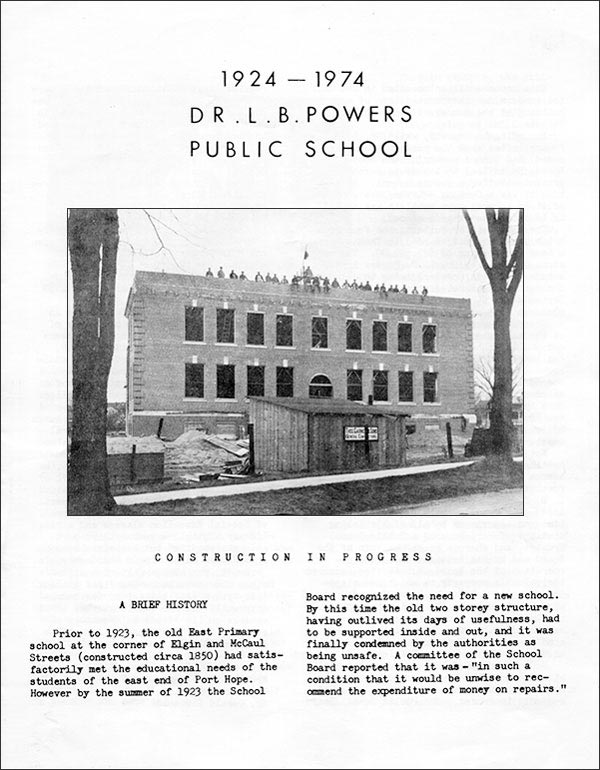
A BRIEF HISTORY
Prior to 1923, the old East Primary school at the corner of Elgin and McCaul Streets (constructed circa 1850) had satisfactorily met the educational needs of the students of the east end of Port Hope. However by the summer of 1923 the School Board recognized the need for a new school. By this time the old two storey structure, having outlived its days of usefulness, had to be supported inside and out, and it was finally condemned by the authorities as being unsafe. A committee of the School Board reported that it was - 'in such a condition that it would be unwise to recommend the expenditure of money on repairs.'
This recommendation resulted in the call for tenders for the construction of a new building at the corner of Hope and Ward Streets.
According to reports, while Dr L B Powers (after whom the present school is named) had been a member of the School Board, he advised that body to purchase the present site for a future school. At that time it was a Commons. Later, use was made of it in several ways until it was needed in 1924 for the present school.
The contract for building the four room brick structure was awarded to Thomas Garnett & Sons for the sum of $27,690.00. The corner stone was laid by Dr L B Powers in the autumn of 1924. However, owing to delays, the building was not completed for use until September 1925, several months behind schedule.
There was great rejoicing by the citizenry of the east end of the town as both teachers and pupils enthusiastically approached their challenges in the new school. Only three rooms were used initially, the fourth being opened 11 years later. The teachers who assumed initial duties in the school were Miss Myrtle Long, Principal and teacher of the 'Primer Class', Miss Theo Black, teacher of 'First Book' and Miss Hazel Wright, teacher of 'Second Book'.
Not until January 1930 at the inaugural meeting of the School Board did the school assume its present name when the following resolution was passed: - That whereas Dr L B Powers who for thirty-five years (1877-1912) gave readily and unreservedly of his time and efforts on behalf of his fellow citizens of Port Hope as a Public School Trustee, and whereas he as Chairman of the Board and by his initiative and the cooperation of the Board at that time, secured the valuable property on which now stands the commodious brick building for educational purposes in Ward No 1; be it therefore resolved that in recognition of his valuable services in the past, the property situated as above stated, be known in the future as 'The Dr L B Powers Public School'.
From the fall of 1936 to June 1946 the attendance at the Dr L B Powers School remained quite steady but by June 1947 had suddenly increased. The Public School Board realized that additional facilities were necessary. Accordingly, an army hut was purchased at Niagara-on-the-Lake and in June 1947 this building was transported to Port Hope. During the months of July and August 1947, it was re-erected at the west side of the Dr Powers School. This addition which was one hundred twenty feet long, provided three additional classrooms making the Dr Powers School a seven room school in September 1947.
The following three teachers, namely - Mr Alex Carruthers, Mrs Howard Jordan and Miss Agnes O'Neill taught in this addition for the first year of its operation. This Annex would continue to be used for eleven years until 1958 when it was removed.
Again by 1949, a sharp increase in attendance indicated the necessity of an addition to the original Dr Powers School. As a result, in April 1949, the first sod was turned for this addition. The contract had been let to Bradford-Hoshal, local contractors, for a little more than one quarter million dollars.
The new addition, which included seven classrooms, a kindergarten, a general purpose room, kitchen, staff rooms, office and washrooms served the needs of the east side of town until 1969 when two portable classrooms were required to accomodate the growing number of students and also to support an expansion of services in the form of Special Education classes and a Library. Within a year a third portable was required but has since been transferred elsewhere in the County.
Dr L B Powers Public School, since the cornerstone was first placed fifty years ago, has served its community well. We are confident that as it embarks on its second half century of service, fine traditions will continue to be established and strengthened.
Information provided by:
Mr Howard Jordan
Mr Lewis Roberts
Mr Gerald Buchanan

Dr Powers School 1946 and 1974
ANNIVERSARY GREETINGS
In commemorating the very notable contribution that Dr L B Powers School has made to education over a half century it seems appropiate to reflect on the role of the school in society across this fifty-year period.
It is important to recognize that its basic purpose has always been centered in the needs of children. While it is undoubtedly oriented towards the past, we must look to it to build citizens for the future. Hence, the nub of the problem for education is to build creatively for the future rather than merely to extend the practices of the past.
Democracy needs young people who have acquired a body of useful knowledge but who also have been taught to be honest, who are stimulated by risk and danger, who are patient but become dangerous when pushed too far, who get satisfaction from achievement, who are patriotic, who have curiosity and humour and imagination.
The heart of any educational system is the classroom teacher. Our ideals for our children can be realized only if we have well-informed, highly-skilled, enthusiastic and dedicated teachers. If a student's mind catches fire it is almost invariably a teacher who sets the spark.
Through example, the attitudes and actions of parents and teachers and private individuals are a major influence in the shaping of children's lives. The standards by which we raise our families and the discipline we impose upon ourselves are of incalculable importance to the future of those who follow us.
A good education is one of the finest gifts afforded by democracy to its children. We must guard it as the precious thing it is, that it may continue to be directed to the benefit of society and to the individuals who comprise its membership.
Throughout its five decades, the Dr L B Powers Public School has responded well to the needs of its pupils. We would ask the public to join with us in wishing for it an equally fulfilling future.
W Frank Thorn
Director of Education
Northumberland & Newcastle Board of Education
GREETINGS FROM NORTHUMBERLAND & NEWCASTLE BOARD OF EDUCATION
It is my pleasure to bring the greetings of the Board of Education on the occasion of the 50th Anniversary of Dr L B Powers School.
Our sincere congratulations are extended to this school for the very successful record of achievement during the past 50 years. A great many citizens do look back with pleasure to their elementary education in Dr Powers Public School, or the East Primary Public School, as it was known in earlier days.
However, it is not possible to rest, feeling that past successes will continue. This school, and all schools, must attempt to meet the needs of to-day's children for tomorrow. It is difficult at this stage to predict what life will be like in the eighties and nineties and what a child will need to know to live a full life in the year 2000.
We are confident that this school will continue to be flexible and discerning in its curriculum design to take full advantage of the increasing knowledge of ourselves, the world and the universe.
H N Sheppard, Chairman
MESSAGE TO STUDENTS
Congratulations on the occasion of your fiftieth year as an elementary school in Port Hope. Elsewhere in this paper you will read about the interesting history of Dr Powers School and I am sure that this information will make you more aware of the contribution to the community made by those students who have preceded you. May I suggest that you keep as many mementoes as possible of this event in order that you can look back in later years on your contribution to the pages of your school's history.
J Walling Reid
Area Superintendent
Central Area
CONGRATULATIONS
Fifty years of service to the education of children is a memorable contribution. The addition of the general purpose room made it possible for this school to become a cultural centre. It provided accommodation for meetings of the Home and School Association, for Public Speaking Contests, for debates on current issues, for concerts and for meetings of the Canadian Club.
It was a pleasure for me to visit this school during my term of office from 1956-1969. The happy atmosphere provided an excellent learning situation and was evidence of the professionalism of the staff.
My congratulations on reaching this milestone and best wishes for the future.
C A Holmes
Area Superintendent of Schools
retired
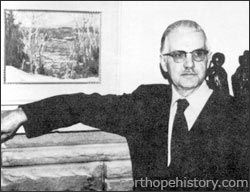
Mr Charles Arnold Holmes
GREETINGS FROM THE MAYOR
The year nineteen hundred and seventy-four marks another milestone in the history of education in Port Hope as the Dr L B Powers Public School on Ward Street commemorates its 50th anniversary.
Replacing its predecessor, the Port Hope East Primary on McCaul Street, which by 1924 had served this community for more than 75 years the new structure named after Dr L B Powers continues to serve in a vital way the kindergarten and primary educational needs of Port Hope.
In recent years we have witnessed many innovations and changes in the educational system. The ultimate aim of education is to stimulate intellectual curiousity in the child and prepare that child to meet the challenges of continued change if the world he lives in remains constant.
On behalf of the Council and the citizens of Port Hope, we extend to Mr Little, the principal and his staff our congratulations for organizing the 50th anniversary programme.
We trust that the students of Dr Powers School will find pleasure in future years in recalling this happy celebration.
M Wladyka
Mayor Town of Port Hope
ANNIVERSARY MESSAGE
It is with great pleasure that I join with former staff members, students and citizens of the community in extending sincere congratulations on the 50th Anniversary of the Dr Powers School.
Named in honour of one of Port Hope's former outstanding citizens, the Dr Powers School has, over the years, played a significant and influential role in the life of the community. As the influence of a teacher on the lives of individuals is carried over from one generation to another, so the school, in this instance, the Dr Powers School, stands as a memorial to those who established it in the interests of community education. As a tangible testimony to the service of school board members and teaching staff who have, over the years, made it truly an institution of learning, it is indeed fitting that its position in the community be recognized at this time.
The anniversary brings back many pleasant and interesting memories of my personal association with the school as a member of the staff under the principalship of Mr Lewis Roberts.
As the school enters its second half century, it is our sincere hope that in adjusting to the changes of our times it may continue to uphold those principles and ideals which have distinguished it in the past, and which have served the community well over the past fifty years.
Alex Carruthers
MPP Durham
MR HOWARD JORDAN, PRINCIPAL 1934-1969
Mr Howard Jordan came from Millbrook to Port Hope as principal of the schools in 1934, earning the handsome salary of $1,400.00 per year.
Before Mr Jordan's appointment the former principal Mr David Sommerville did not approve of girls and boys being in one classroom; so some teachers taught an all girl classroom while others had all boys. This arrangement was changed in 1935 when Mr Jordan decided that mixed classes would contribute more to the education of the children than a biased slant of the thinking powers of only girls or boys. In order that no teacher would get into a rut by teaching only one grade, he or she was given different grades to teach with occasional moves to different classrooms.
Mr Jordan was a man of excellent ability and wide discernment. He worked unceasingly and untiringly for the benefit of the pupils. Any opportunity that afforded itself to increase his knowledge of better education or better materials for education, found him a willing listener.
Never an Easter vacation arrived, that did not find him in Toronto, attending the Ontario Education Association. Any ideas received, which he considered worth passing on to his teachers, reached them, as he conducted monthly teachers' meetings.
Although principal of the schools, he taught Grade 8 in Central School for several years. As his duties became more numerous he was given a supply teacher to help him, and later, when made Supervising Principal of the four elementary schools, his love of teaching was still his main object, and he continued to teach manual training to a class of boys.
His mathematical ability and mechanical background proved invaluable whenever a crisis arose, whether in heating systems, construction or in educational matters.
Mr Jordan was president of the Port Hope Film Council for at least thirty-five years. This was a time consuming job pre-viewing and distributing films and assuming responsibility for projectors and screens. Many people benefited from these films; not only teachers, and pupils, but service clubs, church groups and any other interested parties.
Mr Jordan advocated remedial reading, spelling and arithmetic for slow learners in our schools, with teachers qualified to teach these pupils. He was most eager for teachers to attend conferences, in order to update their knowledge. He also urged his teachers to make use of the scores of film strips in many different subjects, so that their teaching might be more enlightening to their pupils; for a child will remember more of what he takes in through his eyes, than through his ears.
Mr Jordan was truly an educator whose thinking was far in advance of his time.
For twenty-five or twenty-six years, he was secretary-treasurer of our Teachers' Conventions. He did all the corresponding, finding interesting places for us to meet, and arranging for programs that would prove beneficial to the teacher.
Mr Jordan's whole life work, and interest, lay in education. His manner was quiet, but sincere, and no teacher sought his advice without receiving the help he or she desired.
He had wonderful administrative ability, and in his capacity as teacher and friend, he won for himself the respect and gratitude of his teachers, pupils and board members.
In honour of his service to the people of Port Hope, one of the public schools bears his name - that of the Howard Jordan Public School - and stands as a fitting tribute to a man who has served his community with all he had to give in the field of education.
May the years of his retirement which lie ahead, bring him the satisfaction of a selfless life, and the knowledge that he was instrumental in helping lay the foundation for the future lives of many of the young people of Port Hope.
By: Netta Brownlee
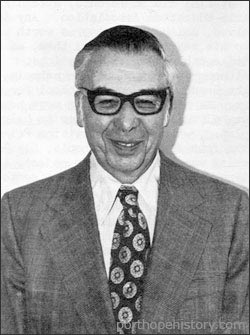
Mr Howard Jordan
LEWIS J ROBERTS, PRINCIPAL 1948-1967
From out of the Northumberland hills to became one of Port Hope's best-known elementary school principals came Lewis J Roberts. Having taught at the Fenella School (Haldimand SS #22) he arrived in Port Hope to commence his teaching duties in September 1930. Lewis was assigned to Central School where he and the late Mr Somnerville taught "readin', writin' and 'rithmetic" to the senior boys and girls. Here he remained for the next twelve years.
In September 1942, Lewis was assigned to what is now the Dr L B Powers School where he was appointed principal in 1948. His length of service in the school is an enviable one - twenty-five years of dedicated service ending with his retirement in June 1967. It was during this time that the new addition was added to the school, being officially opened on November 21, 1950.
Throughout this long teaching career Lewis was able to witness many students attain success and proceed to higher education. He has a fabulous memory for ex-students' names and can, to this day remember where, in the classroom, various students used to be seated, what tricks they used to play on staff and each other and also a number of tricks he kept up his sleeve for use on his students!
Staff members looked upon Lewis Roberts for sound advice and encouragement. His interest in the students' needs were paramount and from across Ontario and, indeed Canada, there are ex-students who look back upon the days spent with him in class as invaluable in guiding them on the long road to their chosen careers.
But Lewis' enthusiasm was not limited to teaching. He is well known for his interest in music (Particularly Male Chorus and Quartettes), politics and travel. Friends will be happy to know he is enjoying his retirement with his wife Florence at their home on Orchard Street in Port Hope.
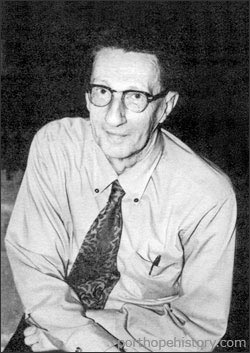
Mr Lewis J Roberts
REMINISCENCES OF DR POWERS SCHOOL
Viewing Port Hope today, through eyes that saw it half a century ago, I realize that it would be difficult for the present generation living in Port Hope, to visualize the town as it was fifty years ago. All the open spaces of long ago, are now built up with houses, factories, churches and schools.
The East Primary School, then on McCaul Street, took care of the primary education of all the children living on Protestant Hill, under two teachers, Miss Myrtle Long and Miss Theo Black.
As the population increased to the five thousand mark, a new four room school was built on Ward Street, known later as Dr Powers School. Enough space was left to build on additional rooms, as the population increased. The school was built in 1924, and when opened the following year, the above two mentioned teachers were transferred to it. When a third teacher was required that year, Miss Hazel Wright was given the position.
At that time final examinations were the order of the day. The principal of Central School, Mr David L Sommerville, went from room to room testing each child in reading, and marking him or her according to his or her power of expression. Each teacher on the staff was asked to set one examination for one grade throughout the schools. For example, one teacher would set arithmetic for Senior Third pupils for all Senior Third grades. No teacher was allowed to preside over her own class during any final exam, and no teacher marked her own class papers. When marking was completed the marks were recorded in the principal's mark book. The home teacher, then added the marks of her own pupils, under the supervision of the principal.
Promotion lists were then prepared for the Evening Guide. Honour students were named first, then pass students, after which came those who were recommended. The names of the failures were omitted. The pupils eagerly awaited the publishing of the results early in July, but the failures were the unhappy children during the summer.
THE BOY WHO DIDN'T PASS
A sad-faced little fellow sits alone in deep disgrace;
There's a lump arising in his throat, and tears drop down his face,
He wandered from his playmates, for he doesn't want to hear
Their shouts of merry laughter, since the world has lost its cheer,
He has sipped the cup of sorrow, he has dripped the bitter glass,
And his heart is fairly breaking - he's the boy who didn't pass.
In the apple tree the robin sings a cheery little song,
But he doesn't seem to hear it, showing plainly something wrong;
Comes his faithful little spaniel for a romp and bit of play,
But the troubled little fellow bids him sternly go away,
And alone he sits in sorrow, with his hair a tangled mass,
And his eyes are red with weeping - he's the boy who didn't pass.
Oh, you who boast a laughing son, and speak of him as bright,
And you who love a little girl, who comes to you at night
With shining eyes and dancing feet, with honours from her school,
Turn to that lonely little lad, who thinks he is a fool,
And take him kindly by the hand, the dullest of his class,
He is the one that most needs love - the boy who didn't pass.
Children from Grade four Dr Powers School entered Grade five at Central School in September if they were promoted.
Once a year the schools were visited by the Inspector who tested each classroom on mental arithmetic, spelling, reading and general knowledge. Colonel E E Snider was the inspector fifty years ago, then came Mr McConnell, Mr Carlton and Mr Holmes. The era of inspectors ended in 1969, when the Northumberland and Durham Board of Education became the governing factor for all schools in this district.
Through the years, many pupils and teachers have come and gone, but still we can recall them vividly to memory. Some from Dr Powers School entering my room at Central were Muriel Abrams, Margaret Butler, Geraldine Hugh, Frances Jex, Dorothy Dodd, Phyllis and Christena Freeman, Pauline Bennett, Crystal Hugh, Doris Inch, Norma,Vivian and Doris Jennings, Betty and Peggy O'Neill.
Among the teachers who taught on Dr Powers staff and whom I still cherish as friends are Agnes O'Neill, Ada Montgomery, Winifred Meldrum, Grace Jordan, Margaret Bigelow, Helen Hodgetts, Elda Launder, Joan Little, Hazel Wright, Ruth Mills, Aline Austin, Lola Thexton, Alma Montizambert, Gwen Watkins, Janet MacGillis, Emily Price, Vera Cummings, Mildred Brothwell, Marian Thurtle, Fraser Carr, Alex Carruthers, Willis Dowler and Lewis Roberts.
My sincere wish for all is that the happy associations formed between teacher and pupils during the first fifty years of Dr Powers School continue and grow for the next half century.
By: Miss Netta Brownlee
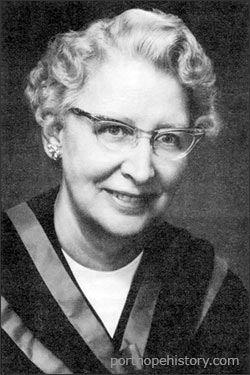
Miss Janet Ferguson 'Netta' Brownlee [1904-1978]
Dear 50th Anniversary Committee:
This is a resume of my teaching days at Dr L B Powers School as nearly as I can recall.
I retired in 1949 after having taught thirty-five years in the town of Port Hope.
My first school was the old East Primary. I joined the teaching staff there in 1907 and taught there until 1919 when they discussed building the new Dr.Powers School. After that I taught at the old West Primary School, supplying also at Central School for Miss Tuer, Senior Third, from 1920 to 1924.
The years 1928 to 1948 were spent in Dr Powers School where I taught Junior and Senior Third class in the upstairs south east corner of the school.
I have very happy memories of all the teachers on the staff, also the pupils, many of whom have become my very best friends.
Mrs Violet Dumond (nee Scott)
Dear 50th Anniversary Committee:
It does not seem to me that 48 years have passed since I began my teaching career in the 'East Primary' School in January, 1926. There were three teachers in the new school - Miss Myrtle Long, Principal and teacher of the 'Primer Class', Miss Theo Black, teacher of the 'First Book', and Miss Hazel Wright, teacher of the 'Second Book', now Grades three and four.
I was delighted to teach in such a fine new school, and as I pass it now, I have pleasant recollections of my three and one-half years there as a teacher, with Colonel E Snider as Inspector.
As I recall, we had no problems with class or yard discipline, working conditions, or reporting to parents. Our equipment was adequate, and the pupils keen for knowledge. Fresh from Peterborough Normal School, I felt prepared to begin a teaching career, from which I retired three years ago.
I am looking forward to visiting my first classroom, upstairs - left.
Mrs Hazel Bausch (nee Wright) 1926-1929
PRINCIPAL'S MESSAGE:
NOSTALGIC AFFAIRS
Traditionally anniversaries are nostalgic affairs
Where gentlemen and ladies join gaily with freres
To share fond reflections and pose retrospections,
And politicians speak of coming elections.
Remember when summers were hotter than hot,
And those dreadful winters that certainly were not;
When boys trod to school in work boots and breeks,
And girls met each morn with roses in cheeks?
Most pupils were scholars and could read and write
While others were not and learned but in spite.
Remember when one doubled two, it made four,
While now it may tally many times more;
When gaiety and frivolity had no place in class,
When the major concern was failure or pass;
When astute Mr Holmes arrived for inspection,
And kiddies stood screaming at their first injections;
When school kids could walk like the rest of us,
They'd scarcely heard of transport by bus?
Remember when schools were for teachers and brats
And not for consultants and those bureaucrats;
When Howard got out on the wrong side of bed,
As he tromped through the halls, how everyone fled;
When Lewis would rave of the mens' musical chorus
And oft' would provide a little sample for us?
Oh! many fond memories I've collected for me,
And I have been here not nearly fifty.
So come now my friends; be happy, be merry.
Come help us celebrate our anniversary.
Come one and come all. Meet friends aplenty.
Share visions of recall that seem 20/20.
Where philosophies and anecdotes come to the fore
Expounding yesterday's virtues one day more.
Gary A Little
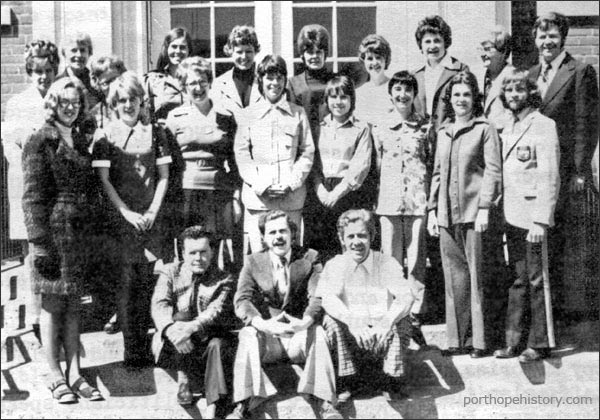
Dr Powers School Staff 1974
cursor over or tap a face to view names
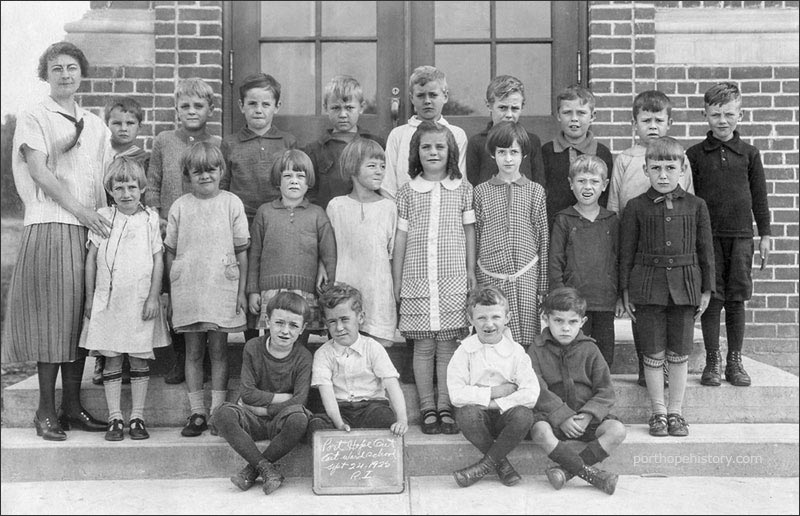
East Ward School (Dr Powers) Room 1 Primer to 1st Book Sept 24, 1925
Pamphlet and class picture from Irene (Baxter) Box
Thanks to Rhoda (Clayton) Bullen and Dorothy (Dodd) Locke
cursor over or tap a face to view names
Use the form below to comment on this article. A name is required, optional email address will not be revealed.